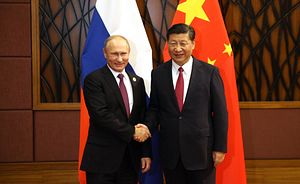In terms of political power equations, the world has seen it all in about a century – “multipolar” to “bipolar” to “unipolar” (and perhaps even “powerless” for a while). If events of the recent past are any indication, we could soon have a new formation – a “tripolar” world, with China joining the United States and Russia at the helm of global affairs.
While the United States has fought to maintain its “superpower” status during the last decade and a half, Russia bided its time on the sidelines. Then, in 2015, it reminded the world that it was no pushover in the “great powers” competition by intervening in Syria, thus altering the course of events in the Middle East.
Three developments in the last few weeks demonstrate that China could be preparing the pitch to further advance its stake in a triangular competition for international influence – President Xi Jinping’s anointment as “leader for life”; the meeting between President Xi and North Korean supreme leader Kim Jong-un; and Beijing’s imposition of counter-tariffs on imports from the United States.
First, the National People’s Congress’s decision in March to abolish the term limit for the office of the president is a sign that Xi is keen to transform China from a global economic giant to a global political power. By making “Xi Jinping Thought” a part of the Constitution while he is still in office, unlike his predecessors who waited until they retired, the Chinese president joins President Donald Trump and Vladimir Putin among the top three most influential leaders in the world.
Attacking the current U.S.-influenced global security order as a legacy of the Cold War, especially in the context of its territorial claims in the South China Sea, Xi has expressed a desire to see “a new type of great power relations” and “a new type of international system” emerging out of the “current struggle for the international order.”
One of the means China has chosen to achieve this end is the Belt and Road Initiative (BRI), which spreads across three continents, in which more than half the world’s population resides. Though the BRI is primarily economic in nature, together with other endeavors like the Asian Infrastructure Investment Bank and the Shanghai Cooperation Organization, the project is likely to be a handy socio-economic and political tool in China’s sphere of influence in the years ahead, as benefactors such as Iran, Turkey and Pakistan, among others, ally more closely with Beijing.
Xi hopes that these initiatives would combine to form a “China model” and yield a new activist Chinese diplomacy that ends Deng Xiaoping’s maxim of “hide your strength, bide your time, and never take the lead.” This would slowly, but surely, also shape a longstanding debate revolving around two Chinese expressions – ‘wang dao’ or ‘ba dao’ (whether to be a strong, benevolent power or a strong, interventionist power).
In the security realm, starting with laying a “solid foundation” by 2010 and making “major progress” by the end of 2020, China plans to “reach the strategic goal of building informationized armed forces and being capable of winning informationized wars by 2050”. This possibility is in sync with some predictions that the Chinese defense budget would surpass that of the United States by about 2035.
Second, China’s new diplomatic activism was evident when North Korea’s Kim met Xi in late March. Though China and North Korea share a special ideological bond, interspersed with tension, this was Kim’s first visit to Beijing since taking over the reins from his father in 2011.
More pertinently, this meeting took place within weeks of Washington announcing a surprise Trump-Kim summit on denuclearization, possibly in May. With the United States possibly influencing its ally South Korea in the breakthrough inter-Korean talks scheduled for late April, the Kim-Xi meeting demonstrated China’s bid to position itself as a counterforce to the United States, as well as sending a message that it was equally relevant to the dialogue.
Third, China’s Ambassador to the United States Cui Tiankai said in early April that it will respond to any new trade tariffs by the United States with countermeasures of the same scale and intensity. The Chinese Foreign Ministry spokesperson, Geng Shuang, endorsed the ambassador’s views, saying Beijing “will resolutely fight to the end” if it is forced into a trade war – “The U.S. has a list. China also will have a list.”
Hidden in this bilateral trade battle are symptoms of a larger global leadership race that could manifest itself in various ways in different parts of the world in the future. According to Ian Bremmer of the Eurasia Group, a U.S.-based political risk consultancy, Beijing believes it can withstand more pain than Washington, and feels U.S. allies may influence President Trump to compromise – “You want to have both a big stick and a big carrot. The size of Trump’s stick is a little smaller because a lot of American allies are saying, ‘We don’t know if we can count on the United States long term. Do we really want to align with them?’”
Irrespective of how the trade tariffs negotiations pan out, it is certain that along with the revision of the U.S.-China trade relationship, their political ties are also likely to change. Since Washington is promoting the “free and open Indo-Pacific” strategy, U.S.-China ties are more likely to get worse than better.
Some analysts have pointed out that that while Washington desires “a unipolar world and a multipolar Asia, China would prefer a multipolar world and a China-centric unipolar Asia.” Though more neutral observers might prefer a “multipolar Asia and a multipolar world”, the prospect exists that China may eventually become the world’s only superpower – particularly if its economic-military influence increases and the U.S.’s political-military influence ebbs.
Dr N. Janardhan is Senior Research Fellow, Gulf-Asia Programme, Emirates Diplomatic Academy, Abu Dhabi.

































